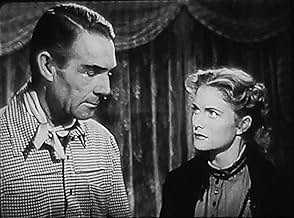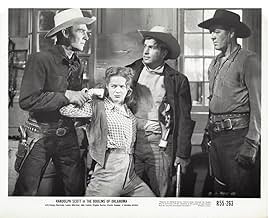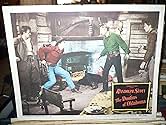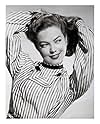Former Dalton gang member Bill Doolin puts together his own bank-robbing gang but federal Marshals are closing in.Former Dalton gang member Bill Doolin puts together his own bank-robbing gang but federal Marshals are closing in.Former Dalton gang member Bill Doolin puts together his own bank-robbing gang but federal Marshals are closing in.
Robert Barrat
- Marshal Heck Thomas
- (as Robert H. Barrat)
Jock Mahoney
- Tulsa Jack Blake
- (as Jock O'Mahoney)
Stanley Andrews
- Coffeyville Sheriff
- (uncredited)
Gertrude Astor
- Saloon Girl
- (uncredited)
Trevor Bardette
- Ezra Johnson - Farmer
- (uncredited)
George Bell
- Minor Role
- (uncredited)
Stanley Blystone
- Jailer
- (uncredited)
- Director
- Writer
- All cast & crew
- Production, box office & more at IMDbPro
Featured reviews
A year after hunting down Bill Doolin in Return of the Badmen, Randolph Scott makes a rare appearance on the wrong side of the law as the same notorious outlaw in The Doolins of Oklahoma. The writers pay only passing attantion to the facts in this solid programmer efficiently directed by Gordon Douglas, and Scott makes a hugely sympathetic hero, who is tricked back into a life of crime by his old gang after going straight with preacher's daughter Virginia Huston.
Randolph Scott usually has a bit of rogue in his characters but there's less of it here than usual. Scott is a member of a gang of thieves and barely escapes when the others are slaughtered by the U.S. Marshal, played by George MacReady who is a bad guy even when he's a good guy, as he is here. That was a close call, Scott reflects, and maybe it's time to hang up my sixguns and take up farming. Not only does he farm (corn) but he marries the daughter of the local church deacon. How good can you get?
Nothing good lasts, however, as anyone over the age of eight knows. His former buddies play a dirty trick on him and expose his identity as a bandit, forcing him to leave wife and home and take to the road again. The Doolin Gang isn't bad, as bank-robbing thieving murdering gangs go. None of them is really evil, although they have their differences. The movie differentiates them pretty well and gives us a chance to get to know them, weaknesses and virtues alike. They have colorful names which I can't remember exactly but are something like "Tulsa," "Brickbat," "Arkansas," "Little Billy." Little Billy is the educated one. He's been to school in Pennsylvania. You can tell because he can quote Benjamin Franklin. He's played in such an effete manner by Noah Beery, Jr., that one wonders if his character isn't one of those barely disguised gay people that some of the older movies used. In any case he does not utter one believable line. But Scott is pretty good, playing it so straight. And John Ireland is very watchable too. I don't know why, but I've always liked John Ireland even in villainous roles. The bridge of his nose seems to have caved in and drawn his eyes closer together. His best role was in "All the King's Men." He had a much more prominent part in "Red River" than we see on screen in today's prints. His role was cut to the bone by director Howard Hawks when Hawks found out that Ireland was romancing Hawks' girl friend at the time, who shall remain nameless here except for her real name -- Letitia laCock -- which wasn't made up by Andy Warhol.
Where was I? Oh, yes, Scott's pretty good. I enjoyed him in his earlier movies, "My Favorite Wife" and "Follow the Fleet," where he established and retired the world's record for repeating the word "swell" on screen. There was a considerable hiatus in his career while he played replaceable heroes in replaceable Westerns, until he made "Ride the High Country" for Sam Peckinpah. He was genuinely good in that -- all rogue, from beginning to end.
Nothing good lasts, however, as anyone over the age of eight knows. His former buddies play a dirty trick on him and expose his identity as a bandit, forcing him to leave wife and home and take to the road again. The Doolin Gang isn't bad, as bank-robbing thieving murdering gangs go. None of them is really evil, although they have their differences. The movie differentiates them pretty well and gives us a chance to get to know them, weaknesses and virtues alike. They have colorful names which I can't remember exactly but are something like "Tulsa," "Brickbat," "Arkansas," "Little Billy." Little Billy is the educated one. He's been to school in Pennsylvania. You can tell because he can quote Benjamin Franklin. He's played in such an effete manner by Noah Beery, Jr., that one wonders if his character isn't one of those barely disguised gay people that some of the older movies used. In any case he does not utter one believable line. But Scott is pretty good, playing it so straight. And John Ireland is very watchable too. I don't know why, but I've always liked John Ireland even in villainous roles. The bridge of his nose seems to have caved in and drawn his eyes closer together. His best role was in "All the King's Men." He had a much more prominent part in "Red River" than we see on screen in today's prints. His role was cut to the bone by director Howard Hawks when Hawks found out that Ireland was romancing Hawks' girl friend at the time, who shall remain nameless here except for her real name -- Letitia laCock -- which wasn't made up by Andy Warhol.
Where was I? Oh, yes, Scott's pretty good. I enjoyed him in his earlier movies, "My Favorite Wife" and "Follow the Fleet," where he established and retired the world's record for repeating the word "swell" on screen. There was a considerable hiatus in his career while he played replaceable heroes in replaceable Westerns, until he made "Ride the High Country" for Sam Peckinpah. He was genuinely good in that -- all rogue, from beginning to end.
Good Scott western, with lots of action, interesting characters, and a solid script. Doolin (Scott) may be a bankrobber but he's also capable of noble deeds. In short, he's a good-bad guy of the sort the iron-jawed Scott could play to perfection. Here he leads a gang of outlaws whose members are known to us by name. Funny thing about the movies. Even bad guys can be humanized enough so that we care about them. That happens more or less with these gang members.
And get a load of the familiar Alabama Hills that Scott and Buddy Boetticher explored in their great Ranown series of oaters. Director Douglas does some effective staging with the Neolithic slabs, worthy of Boetticher. There're some other good touches by Douglas. I especially like the little boy who stares Scott down in church. I don't think I've seen anything quite like it. Surprisingly, veteran screen baddie George Macready plays a federal marshal, which took some getting used to. And what a sweetheart Virginia Huston is. Who wouldn't give up a life of crime for her. It's that element, I think, that lends the ending such poignancy.
All in all, it's a well done 90-minutes by Columbia, somewhere between an A-production and a B. I'm just sorry Scott never got the recognition as a western star that he deserved.
And get a load of the familiar Alabama Hills that Scott and Buddy Boetticher explored in their great Ranown series of oaters. Director Douglas does some effective staging with the Neolithic slabs, worthy of Boetticher. There're some other good touches by Douglas. I especially like the little boy who stares Scott down in church. I don't think I've seen anything quite like it. Surprisingly, veteran screen baddie George Macready plays a federal marshal, which took some getting used to. And what a sweetheart Virginia Huston is. Who wouldn't give up a life of crime for her. It's that element, I think, that lends the ending such poignancy.
All in all, it's a well done 90-minutes by Columbia, somewhere between an A-production and a B. I'm just sorry Scott never got the recognition as a western star that he deserved.
In one of the few times in Randolph Scott's career he played a real character, he's notorious outlaw Bill Doolin who was active in the Oklahoma Territory in the Gay Nineties until the law took its course.
Scott had previously played Wyatt Earp in Frontier Marshal and Bat Masterson in Trail Street and was Sam Starr in Belle Starr. But here he plays real life outlaw protagonist Bill Doolin in his own starring film and not in support of Gene Tierney in Belle Starr or a legendary good guy as in the first two. But after watching The Doolins of Oklahoma you'd think Bill Doolin was forced into a life of crime.
No doubt Bill Doolin (1858-1896) may have been forced economically to turn outlaw, but he certainly did take to the trade, much like his earlier peer Jesse James. The film does touch upon parts of the Doolin legend, such as him being in on the Dalton gang raid in Coffeyville because he was holding the horses. You can't reduce Randolph Scott to holding horses so in this film his horse pulled up lame.
His band certainly had some colorful names and in fact those were the names of his men. I liked John Ireland and Noah Beery, Jr. best of that bunch. George MacReady who showed up in many a Scott western, here is a U.S. Marshal for a change and ostensibly a good guy for once.
It's not history, but it's a good Randolph Scott western that forgets the facts and films the legend.
Scott had previously played Wyatt Earp in Frontier Marshal and Bat Masterson in Trail Street and was Sam Starr in Belle Starr. But here he plays real life outlaw protagonist Bill Doolin in his own starring film and not in support of Gene Tierney in Belle Starr or a legendary good guy as in the first two. But after watching The Doolins of Oklahoma you'd think Bill Doolin was forced into a life of crime.
No doubt Bill Doolin (1858-1896) may have been forced economically to turn outlaw, but he certainly did take to the trade, much like his earlier peer Jesse James. The film does touch upon parts of the Doolin legend, such as him being in on the Dalton gang raid in Coffeyville because he was holding the horses. You can't reduce Randolph Scott to holding horses so in this film his horse pulled up lame.
His band certainly had some colorful names and in fact those were the names of his men. I liked John Ireland and Noah Beery, Jr. best of that bunch. George MacReady who showed up in many a Scott western, here is a U.S. Marshal for a change and ostensibly a good guy for once.
It's not history, but it's a good Randolph Scott western that forgets the facts and films the legend.
Bill Doolin was an outlaw operating in Oklahoma territory in the 1890s who was captured in 1896 by a devoted lawman named Bill Tilghman who had spent four years doggedly pursuing him. Doolin escaped from prison but was eventually shot down by a U.S. Marshal named Heck Thomas. In THE DOOLINS OF OKLAHOMA (1949), Doolin is played as something of a "good" outlaw by Randolph Scott. He's tall, handsome, polite to civilians, and blessed with a remarkable degree of self-control. He even goes straight at one point and marries a pretty, loving farm girl (Virginia Huston) and starts up a working farm. But, unfortunately, he gets pulled back into the outlaw life. As directed by Gordon Douglas, the film offers several bursts of exciting, well-staged western action, including lots of chases on horseback and some amazing feats of horsemanship. Scott is doubled in the long shots, but he does his own furious riding in medium-shot. Most of the chase scenes appear to have been shot in the familiar rocky terrain around Lone Pine, California, at the foot of the Sierras, a dramatic landscape perfect for such scenes, even if it looks nothing like Oklahoma.
Western buffs will enjoy the way the film incorporates other historical western figures, including a couple who had later movies of their own. At the beginning we see the Dalton gang carry out the famed disastrous raid on Coffeyville, Kansas, a fiasco that only Doolin survives because his horse went lame at the last minute (which matches the account of the raid supplied in the book, "Bill Tilghman, Marshal of the Last Frontier," by Floyd Miller). The Dalton gang, of course, has been the subject of many westerns. Later in the film, after Doolin has recruited various gang members, they all adopt the habit of hiding out between jobs in the wide open town of Ingalls, where one of the gang, Bitter Creek (John Ireland), has a girlfriend. She is called Rose of Cimarron and is played in a mature, elegant fashion by Louise Allbritton (SON OF Dracula). One of the characters we meet in Ingalls is a spunky little two-fisted, sharp-shootin' teenage cowgirl named Cattle Annie who wants to join the gang and is well-played by Dona Drake (who was 35 at the time!). A later western, ROSE OF CIMARRON (1952), starred Mala Powers in the title role and I remember her as quite a fiery display of dark-eyed female outlawry. In 1980, there was a film called CATTLE ANNIE AND LITTLE BRITCHES, which starred Amanda Plummer as Cattle Annie, Burt Lancaster as Bill Doolin, and Rod Steiger as Bill Tilghman.
There's a U.S. Marshal in this film named Sam Hughes who pursues Doolin for nearly all of the film's 90 minutes. He appears to be based on Tilghman. Why the name change when Marshal Heck Thomas is left intact, I can't say. Hughes is played by George Macready and Thomas is played by Robert Barrat. Tilghman, one of the most daring of western lawmen, was played by name in only two films I know of, the aforementioned CATTLE ANNIE and the TV movie, YOU KNOW MY NAME (1999), which starred Sam Elliott. The book I mentioned, "Bill Tilghman, Marshal of the Last Frontier," by Floyd Miller (Doubleday, 1968), is highly recommended if you want to read a vivid account of a real western lawman's exciting career. As for this movie, I would urge you not to expect the most accurate portrayal of events, but to take it as a piece of solid, well-crafted western entertainment, with an above-average cast and an attention to details normally left out of studio westerns.
Western buffs will enjoy the way the film incorporates other historical western figures, including a couple who had later movies of their own. At the beginning we see the Dalton gang carry out the famed disastrous raid on Coffeyville, Kansas, a fiasco that only Doolin survives because his horse went lame at the last minute (which matches the account of the raid supplied in the book, "Bill Tilghman, Marshal of the Last Frontier," by Floyd Miller). The Dalton gang, of course, has been the subject of many westerns. Later in the film, after Doolin has recruited various gang members, they all adopt the habit of hiding out between jobs in the wide open town of Ingalls, where one of the gang, Bitter Creek (John Ireland), has a girlfriend. She is called Rose of Cimarron and is played in a mature, elegant fashion by Louise Allbritton (SON OF Dracula). One of the characters we meet in Ingalls is a spunky little two-fisted, sharp-shootin' teenage cowgirl named Cattle Annie who wants to join the gang and is well-played by Dona Drake (who was 35 at the time!). A later western, ROSE OF CIMARRON (1952), starred Mala Powers in the title role and I remember her as quite a fiery display of dark-eyed female outlawry. In 1980, there was a film called CATTLE ANNIE AND LITTLE BRITCHES, which starred Amanda Plummer as Cattle Annie, Burt Lancaster as Bill Doolin, and Rod Steiger as Bill Tilghman.
There's a U.S. Marshal in this film named Sam Hughes who pursues Doolin for nearly all of the film's 90 minutes. He appears to be based on Tilghman. Why the name change when Marshal Heck Thomas is left intact, I can't say. Hughes is played by George Macready and Thomas is played by Robert Barrat. Tilghman, one of the most daring of western lawmen, was played by name in only two films I know of, the aforementioned CATTLE ANNIE and the TV movie, YOU KNOW MY NAME (1999), which starred Sam Elliott. The book I mentioned, "Bill Tilghman, Marshal of the Last Frontier," by Floyd Miller (Doubleday, 1968), is highly recommended if you want to read a vivid account of a real western lawman's exciting career. As for this movie, I would urge you not to expect the most accurate portrayal of events, but to take it as a piece of solid, well-crafted western entertainment, with an above-average cast and an attention to details normally left out of studio westerns.
Did you know
- TriviaBill Doolin's character was evoked thirty years later in Lamont Johnson's "Cattle Annie and Little Britches", featuring Burt Lancaster as Doolin.
- GoofsEmmett Dalton wasn't killed in 1892 after the attempted Coffeyville bank robbery. He actually died in 1937, after becoming a writer and actor.
- Quotes
Bill Doolin: I see you still have the habit of sleeping outside.
Thomas 'Arkansas' Jones: Yeah, you live longer that way. See, when the shooting starts, I don't have to stop to open the door.
- ConnectionsEdited from The Desperadoes (1943)
- How long is The Doolins of Oklahoma?Powered by Alexa
Details
- Runtime
- 1h 30m(90 min)
- Color
- Aspect ratio
- 1.37 : 1
Contribute to this page
Suggest an edit or add missing content







































